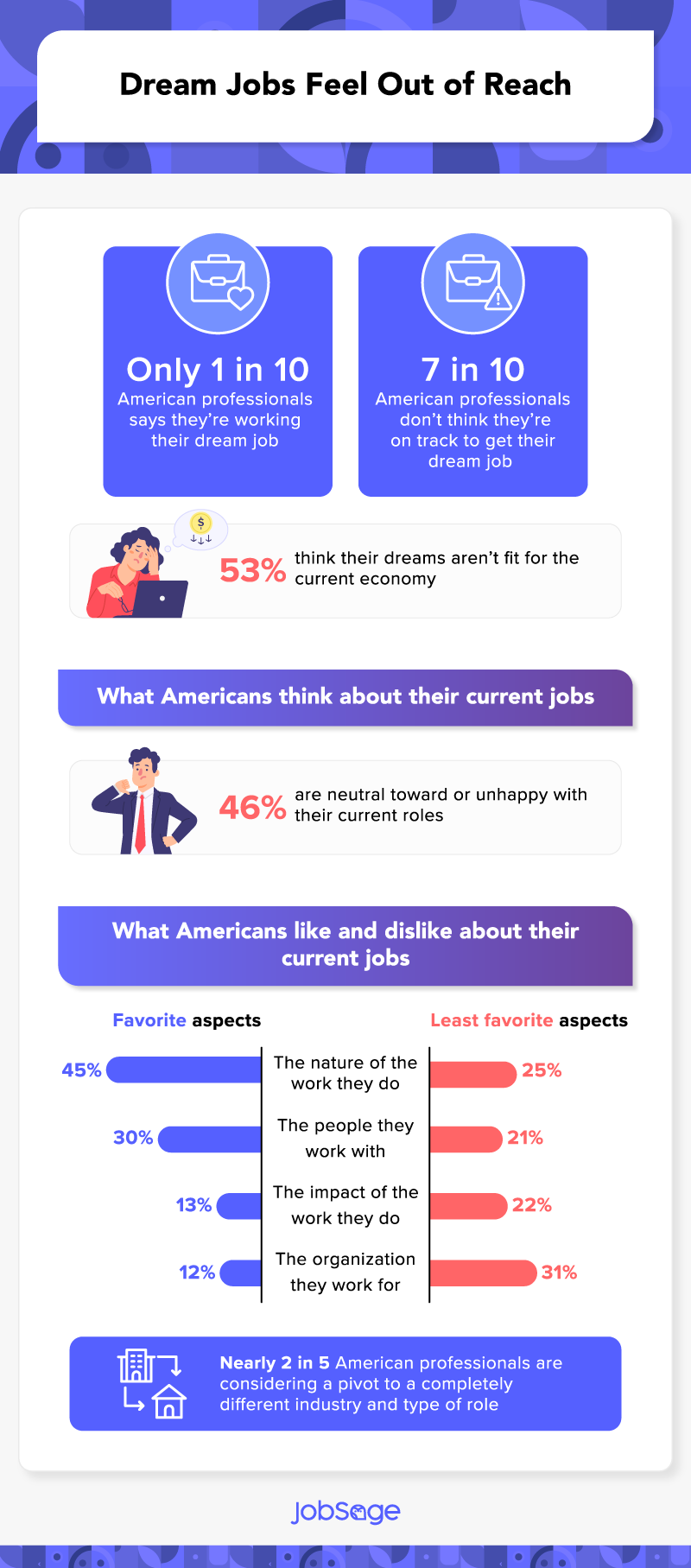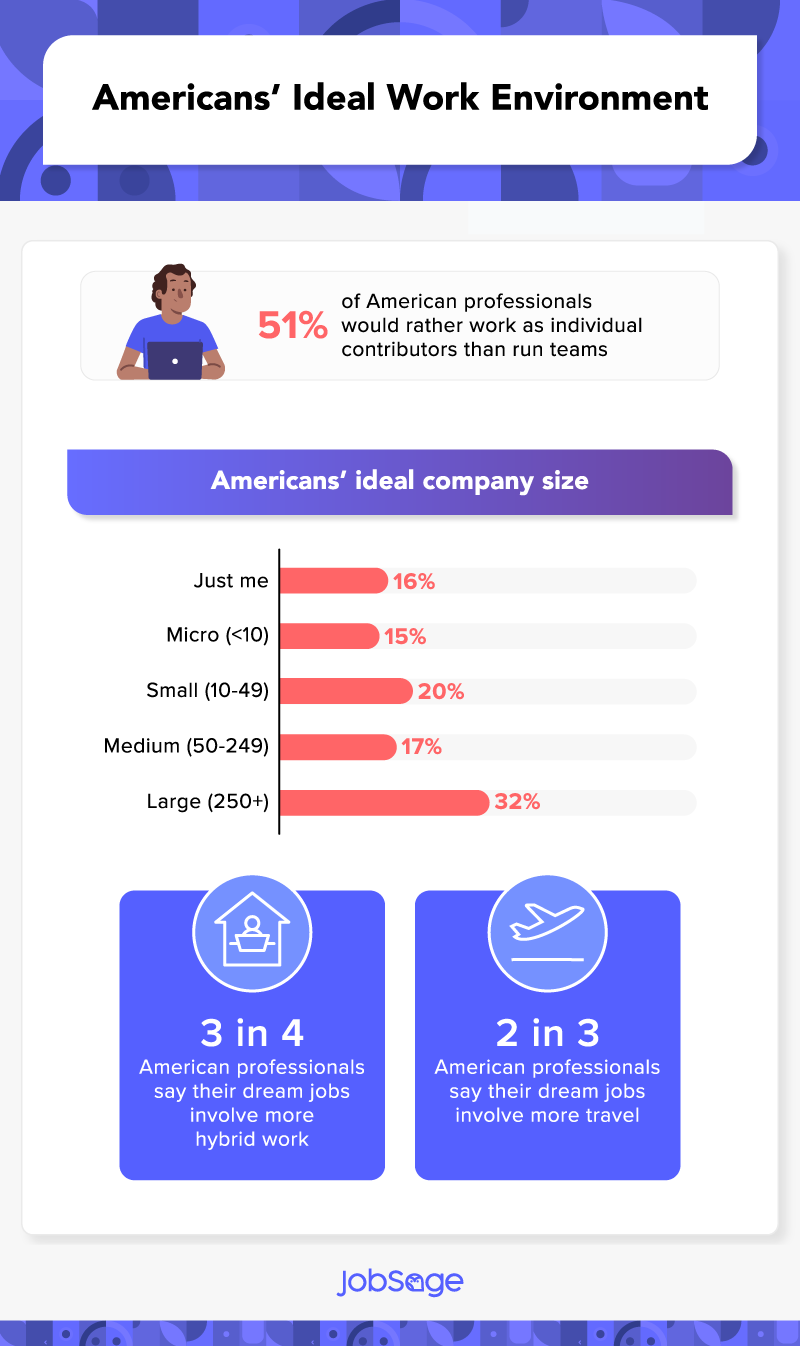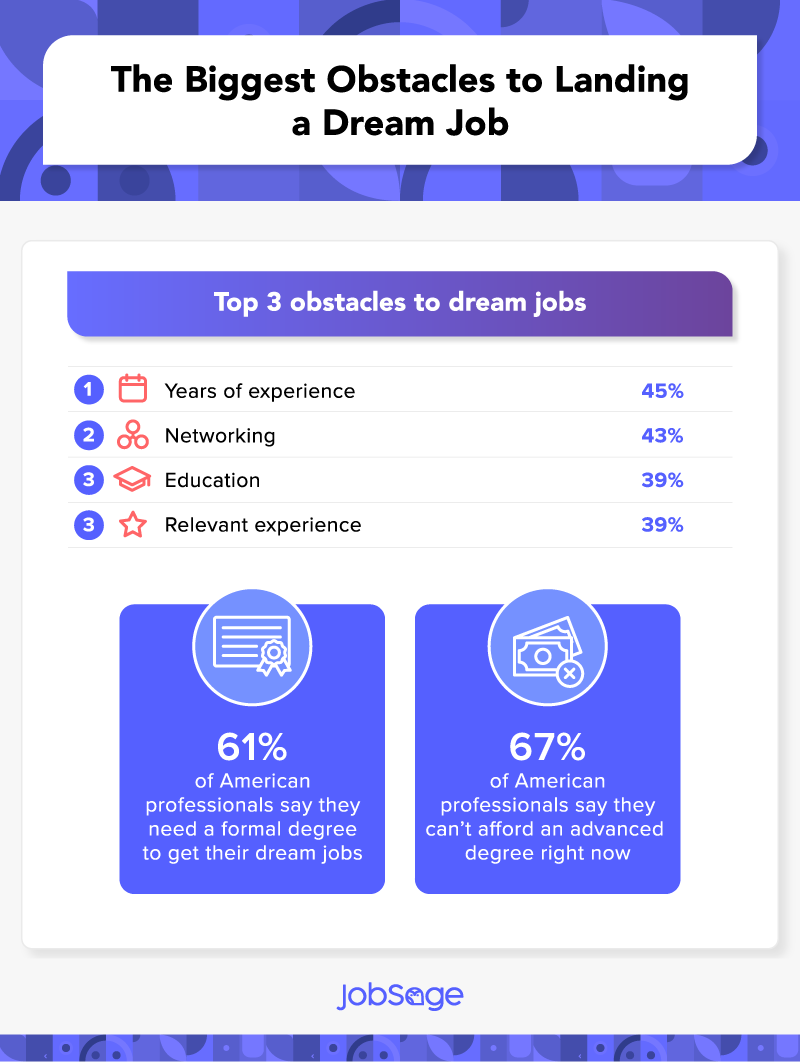When it comes to their future careers, kids have big dreams: They want to become veterinarians, doctors and even astronauts. But what happens when they finally grow up?
JobSage surveyed over 1,200 Americans in the workforce about their current jobs versus their ideal ones to find out who’s “living the dream” right now, and for those who aren’t working their dream jobs, to discover what’s standing in their way. This post lays out the data and reveals who’s living the dream and who’s just dreaming.
Key findings
- Only 1 in 10 Americans says they’re working their dream job.
- Of those surveyed, 7 in 10 don’t think they’re on track to get their dream job.
- Over half (53%) of Americans think their dreams aren’t fit for the current economy.
- If advanced degrees are required for their dream jobs, 2 in 3 American professionals say they can’t afford the price of education.
For many, dream jobs remain just that
Dreams have not yet become reality for many people. Only 1 in 10 Americans says they’re working their dream job right now — and 7 in 10 say they aren’t on track to land their dream jobs.
With rises in layoffs, the country’s current economic climate may have something to do with this pessimism from the workforce. Of those we surveyed, only 47% of Americans said their dreams are realistic in the current economy.

Overall, 51% of Americans are indifferent to, or even unhappy, with their current roles. About half (45%) of American professionals like the nature of they work they do and about a third (30%) say they like the people they work with — but they’re not so sure about the organizations they work for. Nearly a third (31%) said their least favorite aspect of their current role is the organization itself.
For some, the answer might be a professional pivot. Nearly 2 in 5 professionals are considering a switch to a completely different industry or type of role.
Tech, arts & entertainment and healthcare are the dreamiest industries
So, what would Americans do for work if they could have their pick? We asked professionals which industry they would want to work in, and technology came out on top. Other top choices are entertainment, art and design, healthcare and writing and journalism.
Of course, money matters, too. Across industries, the median “dream” salary is $120,000 — that’s more than double the current median salary of about $50,000, per the Bureau of Labor Statistics.

Quite a few professionals told us that they don’t like their companies — but where do they want to work? Here are Americans’ top-ten dream organizations:
- Apple
- A university or school
- Disney
- A hospital or healthcare facility
- Amazon
- Tesla
- ESPN
- NFL
Some dreams are more realistic than others. We found 46% of those who dreamed about working in the tech industry actually achieved it. However, success rates across other dream industries aren’t as high. Only about a quarter of those who wanted to work in education (26%) and healthcare (25%) made it as did 21% of those who wanted to work in art and design.
Those who wanted to work in entertainment or become writers have had the hardest times. Only 3% of would-be entertainment professionals made it, and only 2% of would-be writers actually became one.
Many professionals dream of more independent work
For many Americans — especially women and older folks — being their own boss is the real dream. Of those surveyed, 51% of professionals said they would rather just do their own work than run a team of employees.

We found that women are more interested in being individual contributors: 56% of them said they’d like to work as individual contributors, compared to 46% of men. What’s more: 20% of women dream of working completely alone, versus 12% of men.
On the other hand, Gen Z professionals tend to want to work on teams. In fact, nearly 2 in 3 (61%) of those we surveyed said their dream job would involve working on a team, compared to less than half of respondents from older generations.
It makes sense, then, that Gen Z professionals want to join larger companies. Nearly 2 in 3 (62%) said their ideal company is medium-sized (50 to 249 employees) or large (250-plus employees).
We saw more consensus around day-to-day work structure — or lack thereof. All in all, Americans want more flexibility when it comes to work: 3 in 4 professionals say their dream jobs involve hybrid work, and 2 in 3 want more travel.
Education is a big barrier to dream jobs
In addition to learning what Americans dream about when it comes to their work, we also discovered what obstacles stand in their way. For some, landing a dream job is just a matter of time — but others say they need to meet the right people and gain the right skills. American professionals say the three biggest obstacles between them and their dream jobs are:
- Years of experience: 45%
- Networking: 43%
- Education: 39%
- Relevant experience: 39%

Advanced education is another big roadblock. Just over 6 in 10 (61%) say they need a formal degree to land their dream jobs, but 67% say they can’t afford one right now. Of professionals surveyed, 42% said they need a bachelor’s degree if they want to land their dream jobs. More than half (58%) say an advanced degree like a masters, PhD or doctorate is necessary if they want to achieve their dreams.
What will people do to achieve their dreams?
Many Americans are willing to go the extra mile to realize their dreams. Over half (56%) would work extra hours — Gen Z professionals especially (68%). Some are ready to go back to school (48%), and more than a third would skip out on socializing (37%) and work multiple jobs (31%).
However, some efforts are a bridge too far. Most professionals are reluctant to knowingly go into debt (14%) or sacrifice their relationships (14%) for the sake of a dream job.
Ultimately landing a dream job can be a long game, and it’s important to get the right experience, the required skills and the right fit for the role you want most. Researching potential employers and reading reviews can ensure your principles align with theirs before you sign on.
Methodology: We surveyed 1,210 full-time employees in the U.S. on September 10, 2022. 8% were Baby Boomers, 25% Gen X, 55% Millennials and 12% Gen Z. 50% identified as men, 49% as women and 1% nonbinary.
